2013 年专业英语四级考试真题及答案
PART I DICTATION [15 MIN]
Listen to the following passage. Altogether the passage will be read to you four
times. During the first reading, which will be done at normal speed, listen and try
to understand the meaning. For the second and third readings, the passage will be
read sentence by sentence, or phrase by phrase, with intervals of 15 seconds. The
last reading will be done at normal speed again and during this time you should check
your work. You will then be given 2 minutes to check through your work once more.
Please write the whole passage on ANSWER SHEET ONE.
PART II LISTENING COMPREHENSION [20 MIN]
In Sections A, B and C you will hear everything ONCE ONLY. Listen carefully and then
answer the questions that follow. Mark the best answer to each question on Answer
Sheet Two.
SECTION A CONVERSATIONS
In this section you will hear several conversations. Listen to the conversations
carefully and then answer the questions that follow.
Questions 1 to 3 are based on the following conversation. At the end of the
conversation, you will be given 15 seconds to answer the questions.
Now, listen to the conversation.
1. According to the conversation, an example of “Christmas trimmings” could be
A. presents.
B. fruits.
C. sauce.
D. meat.
2. A Christmas lunch would include all the following EXCEPT
A. roast turkey.
B. sweet potatoes.
C. meat.
D. carrots.
3. Why did Helen come to Rob’s house?
A. She wanted to talk to Rob.
B. She had come to help Rob.
C. She had been invited to lunch.
D. She was interested in cooking.
Questions 4 to 7 are based on the following conversation. At the end of the
conversation, you will be given 20 seconds to answer the questions.
Now, listen to the conversation.
4. Why did the woman phone the club?
A. She wanted to know more about it.
B. She was a new comer and felt lonely.
C. She wanted to learn a new language.
D. She was interested in social activities.
5. We learn from the conversation that the club
�
A. mainly organizes language activities.
B. accepts members from local students.
C. has been set up for a long time.
D. is increasing its membership.
6. According to the conversation, the woman might come to practice German on
A. Wednesday.
B. Tuesday.
C. Monday.
D. Friday.
7. What is the man going to do after the conversation?
A. Call up the woman for her address.
B. Wait for the woman to call him again.
C. Mail the woman some information.
D. Wait for the woman to pick up a form.
Questions 8 to 10 are based on the following conversation. At the end of the
conversation, you will be given 15 seconds to answer the questions.
Now, listen to the conversation.
8. According to the woman, what actually makes her job difficult?
A. Difficult questions from interviewees.
B. Embarrassing requests from interviewees.
C. Lack of professional background.
D. Lack of interviewing skills.
9. The woman uses all the following adjectives when talking about attending job fairs
EXCEPT
A. prospective.
B. useful.
C. important.
D. tiring.
10. We learn from the conversation that the woman
A. works better at job fairs.
B. prefers honest people.
C. often works on her own.
D. is experienced in her work.
SECTION B PASSAGES
In this section, you will hear several passages. Listen to the passages carefully
and then answer the questions that follow.
Questions 11 to 13 are based on the following passage. At the end of the passage,
you will be given 15 seconds to answer the questions.
Now, listen to the passage.
11. According to today''s weather forecast, which part of Europe has dry weather?
A. Scandinavian mountains.
B. Northwestern Europe.
C. Northern Europe.
D. Southern Europe.
�
12. In which part of Europe does the weather stay both fine and cool?
A. Southern Europe.
B. Northern Europe.
C. Eastern Europe.
D. Northwestern Europe.
13. In which region will the weather change tomorrow?
A. Northern parts of the Mediterranean.
B. Eastern parts of the Mediterranean.
C. Central parts of the Mediterranean.
D. Southern parts of the Mediterranean.
Questions 14 to 17 are based on the following passage. At the end of the passage,
you will be given 20 seconds to answer the questions.
Now, listen to the passage.
14. According to the passage, what benefit can technology bring to people?
A. Closer contact with modern devices.
B. Greater changes in social organization.
C. Better understanding of mass media.
D. More useful information to better their life.
15. The speaker questions about everybody''s access to technological advances. The
main reason is
A. illiteracy.
B. poverty.
C. food shortage.
D. ignorance.
16. According to the UN plan, all the following will be achieved within ten years
EXCEPT
A. giving everyone a radio or TV.
B. starting to carry out the scheme in ten years.
C. offering internet service to more people.
D. providing more job opportunities.
17. What could be the topic of the passage?
A. Growth in telecommunications.
B. Technology and the developing world.
C. Education and medical care.
D. Building an information society.
Questions 18 to 20 are based on the following passage. At the end of the passage,
you will be given 15 seconds to answer the questions.
Now, listen to the passage.
18. People in Latin America wear something __________ to express their hopes for
wealth in the New Year.
A. new
B. red
C. white
D. yellow
�
19. Which of the following New Year’s traditions signals friendship?
A. Throwing old dishes.
B. Wearing something red.
C. Wearing something white.
D. Eating round fruits.
20. Which of the following is NOT mentioned as one''s own New Year''s tradition?
A. Watching TV at home.
B. Going to bed early.
C. Visiting friends.
D. Running and shouting outside.
SECTION C NEWS BROADCAST
In this section, you will hear several news items. Listen to them carefully and then
answer the questions that follow.
Questions 21 and 22 are based on the following news. At the end of the news item,
you will be given 10 seconds to answer the questions.
Now, listen to the news.
21. What is happening to the schools in Fairfax County this school year?
A. 15 schools have started social studies.
B. 15 schools have used digital textbooks.
C. Students are ready to use electronic resources.
D. Digital textbooks are used for social studies.
22. With digital textbooks, schools have saved about __________ million dollars.
A. 1
B. 2
C. 3
D. 4
Questions 23 and 24 are based on the following news. At the end of the news item,
you will be given 10 seconds to answer the questions.
Now, listen to the news.
23. Who found the suspicious item at the airport?
A. TSA agents.
B. FBI agents.
C. The police.
D. Passengers.
24. Which of the following statements is INCORRECT?
A. The terminal was closed temporarily afterwards.
B. There was a thorough search inside the airport.
C. Passengers at the airport were safe and sound.
D. The security authorities identified the explosives.
Questions 25 and 26 are based on the following news. At the end of the news item,
you will be given 10 seconds to answer the questions.
Now, listen to the news.
25. According to the news item, doctors use art therapy to treat the following
problems EXCEPT
�
A. alcohol abuse.
B. smoking.
C. depression.
D. schizophrenia.
26. Why did doctors introduce art therapy in the first place?
A. To prevent patients from smoking.
B. To better understand patients.
C. To get patients occupied.
D. To teach patients some skills.
Question 27 and 28 are based on the following news. At the end of the news item,
you will be given 10 seconds to answer the questions.
Now, listen to the news.
27. What is the main purpose of the new rules?
A. To reduce the number of pilots on duty.
B. To prevent pilots from working overtime.
C. To ensure an adequate amount of sleep.
D. To fix the amount of work for each pilot.
28. The Independent Pilots Association was unhappy about the new rules because they
A. had only covered cargo plane pilots.
B. had failed to cover all the pilots.
C. would be put into effect in two years.
D. would be too costly if implemented.
Questions 29 and 30 are based on the following news. At the end of the news item,
you will be given 10 seconds to answer the questions.
Now, listen to the news.
29. Why is increase in livestock production necessary?
A. Because livestock production is highly efficient.
B. Because more people will become wealthier.
C. Because it may help double food production.
D. Because it has fewer ecological risks.
30. What does the word “challenge” mean in the news item?
A. Balance between human survival and ecology.
B. Conflict between less land and more production.
C. Difference between present and future needs.
D. Calls by environmental critics to consume less meat.
PART III CLOZE [15 MIN]
Decide which of the choices given below would best complete the passage if inserted
in the corresponding blanks. Mark the best choice for each blank on Answer Sheet
Two.
Everyone knows that taxation is necessary in a modern state: without it, it (31)
______ not be possible to pay the soldiers and policemen who protect us; (32) ______
the workers in government offices who (33) ______ our health, our food, our water,
and all the other things that we cannot do for ourselves. (34) ______ taxation, we
pay for things that we need just (35) ______ we need somewhere to live and something
�
to eat. But (36) ______ everyone knows that taxation is necessary, different people
have different ideas about (37) ______ taxation should be arranged.
In most countries, a direct tax on (38) ______, which is called income tax, (39)
______. It is arranged in such (40) ______ that the poorest people pay nothing, and
the percentage of tax grows (41) ______ as the taxpayer''s income grows. In some
countries, for example, the tax on the richest people (42) ______ as high as
ninety-five per cent!
(43) ______ countries with taxation nearly (44) ______ have indirect taxation too.
Many things imported into the country have to pay taxes or “duties.” Of course,
it is the men and women who buy these imported things in the shops (45) ______ really
have to pay the duties, in the (46) ______ of higher prices. In some countries, (47)
______, there is a tax on things sold in the shops. If the most necessary things
are taxed, a lot of money is (48) ______ but the poor people suffer most. If
unnecessary things (49) ______ jewels and fur coats are taxed, less money is obtained
but the tax is (50) ______, as the rich pay it.
31.
A. can
B. may
C. could
D. would
32.
A. nor
B. neither
C. never
D. not
33.
A. look into
B. look over
C. look after
D. look through
34.
A. In accordance with
B. By means of
C. With reference to
D. On account of
35.
A. as well as
B. as good as
C. as such as
D. as much as
36.
A. if
B. when
C. though
�
D. as
38.
A. persons
B. sectors
C. communities
D. classes
39.
A. remains
B. stays
C. exists
D. happens
40.
A. form
B. way
C. measure
D. method
41.
A. quicker
B. speedier
C. more
D. larger
42.
A. grows up
B. increases up
C. goes up
D. lifts up
43.
A. But
B. Consequently
C. Similarly
D. And
44.
A. periodically
B. almost
C. often
D. always
45.
A. which
B. who
C. what
D. whom
46.
A. manner
B. form
�
C. means
D. way
47.
A. either
B. also
C. too
D. often
48.
A. lent
B. saved
C. borrowed
D. collected
49.
A. alike
B. like
C. as
D. for
50.
A. heavier
B. fairer
C. finer
D. better
PART IV GRAMMAR & VOCABULARY [15 MIN]
There are thirty sentences in this section. Beneath each sentence there are four
words or phrases marked A, B, C and D. Choose one word or phrase that best completes
the sentence.
Mark your answers on Answer Sheet Two.
51. Facing the board of directors, he didn’t deny __________ breaking the agreement.
A. him B. it C. his D. its
52. Xinchun returned from aboard a different man. The italicized part functions as
a (n) __________.
A. appositive (同位语) B. object C. adverbial D. complement.
53. Which of the following is a compound word (复合词)?
A. Nonsmoker.
B. Deadline.
C. Meanness.
D. Misfit.
54. Which of the following sentences contains subjunctive mood?
A. Lucy insisted that her son get home before 5 o’clock?
B. She used to drive to work, but now she takes the city metro.
C. Walk straight ahead, and don''t turn till the second traffic lights.
D. Paul will cancel his flight if he cannot get his visa by Friday.
55. The following determiners(限定词) can be used with both plural and uncountable
nouns EXCEPT
�
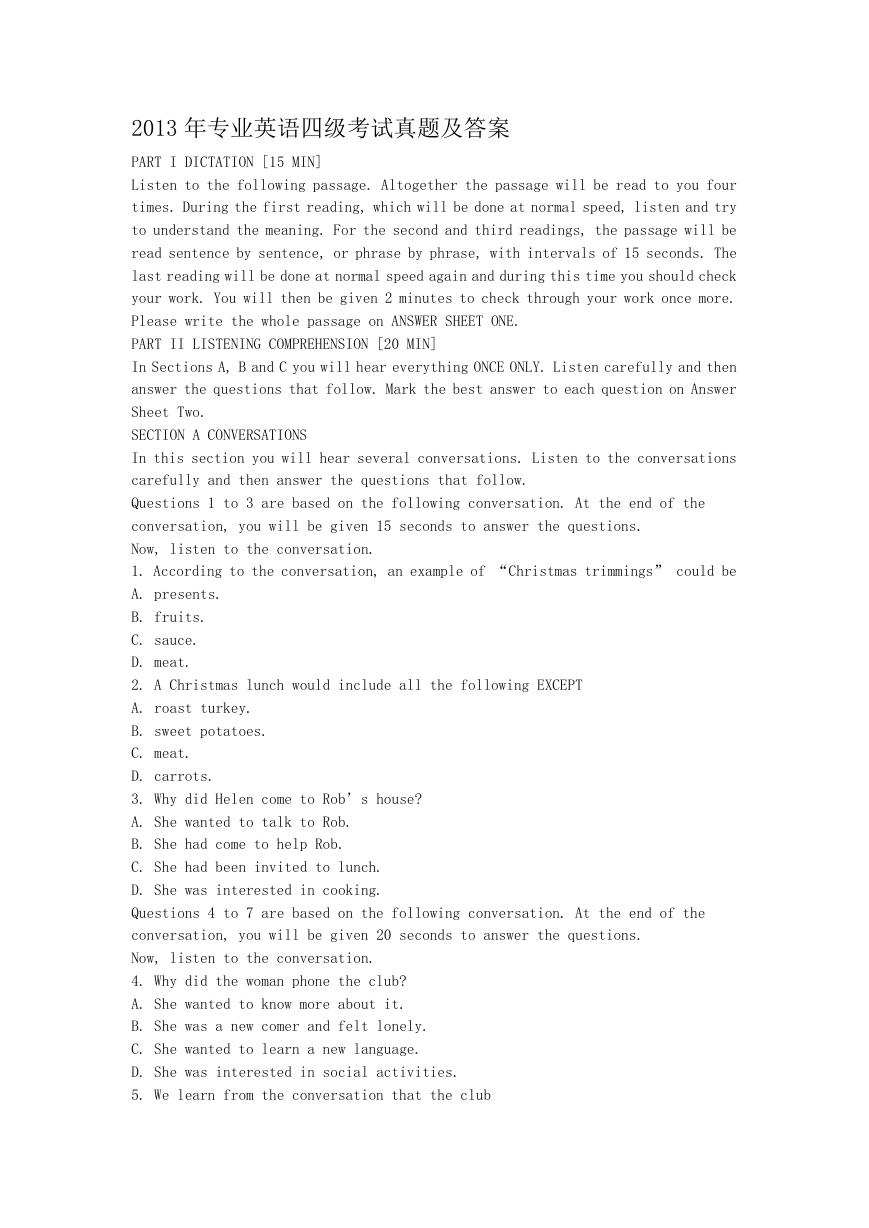
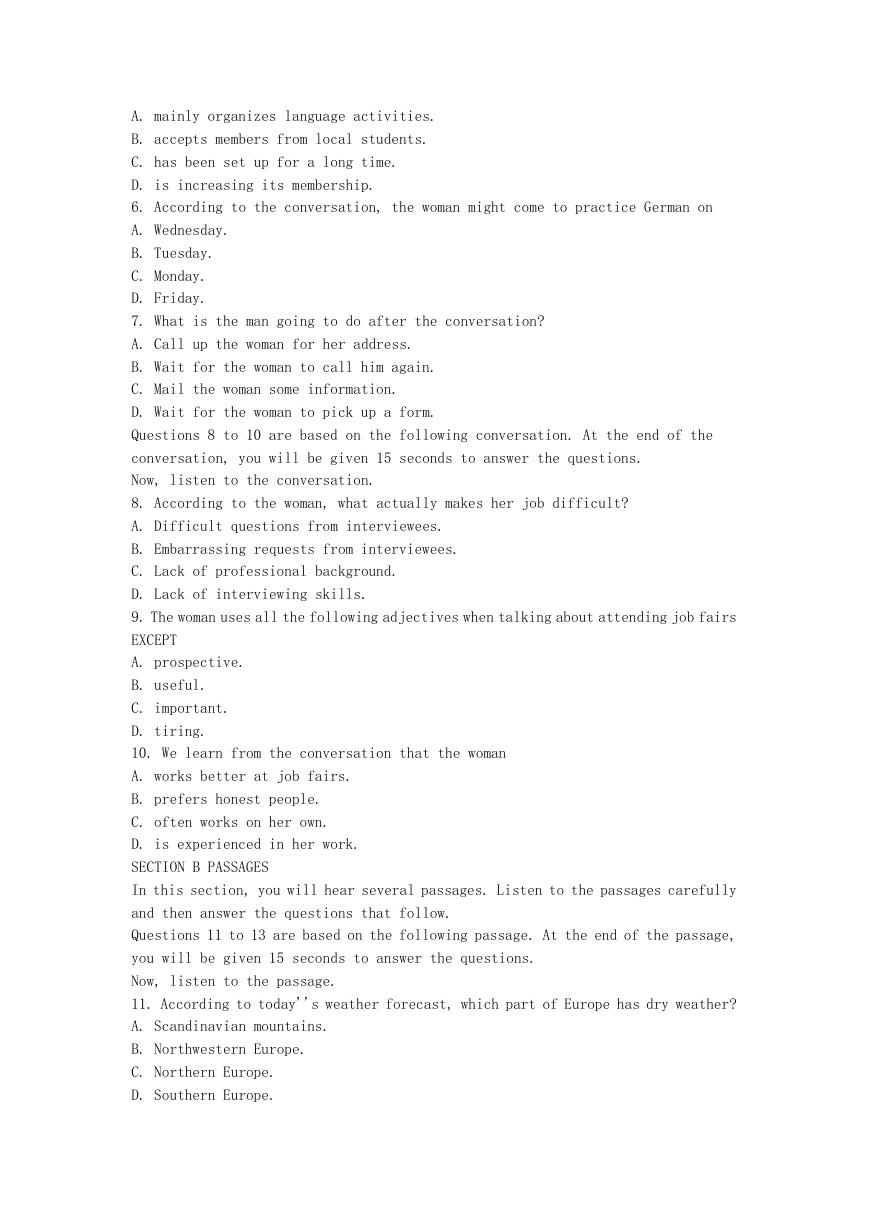
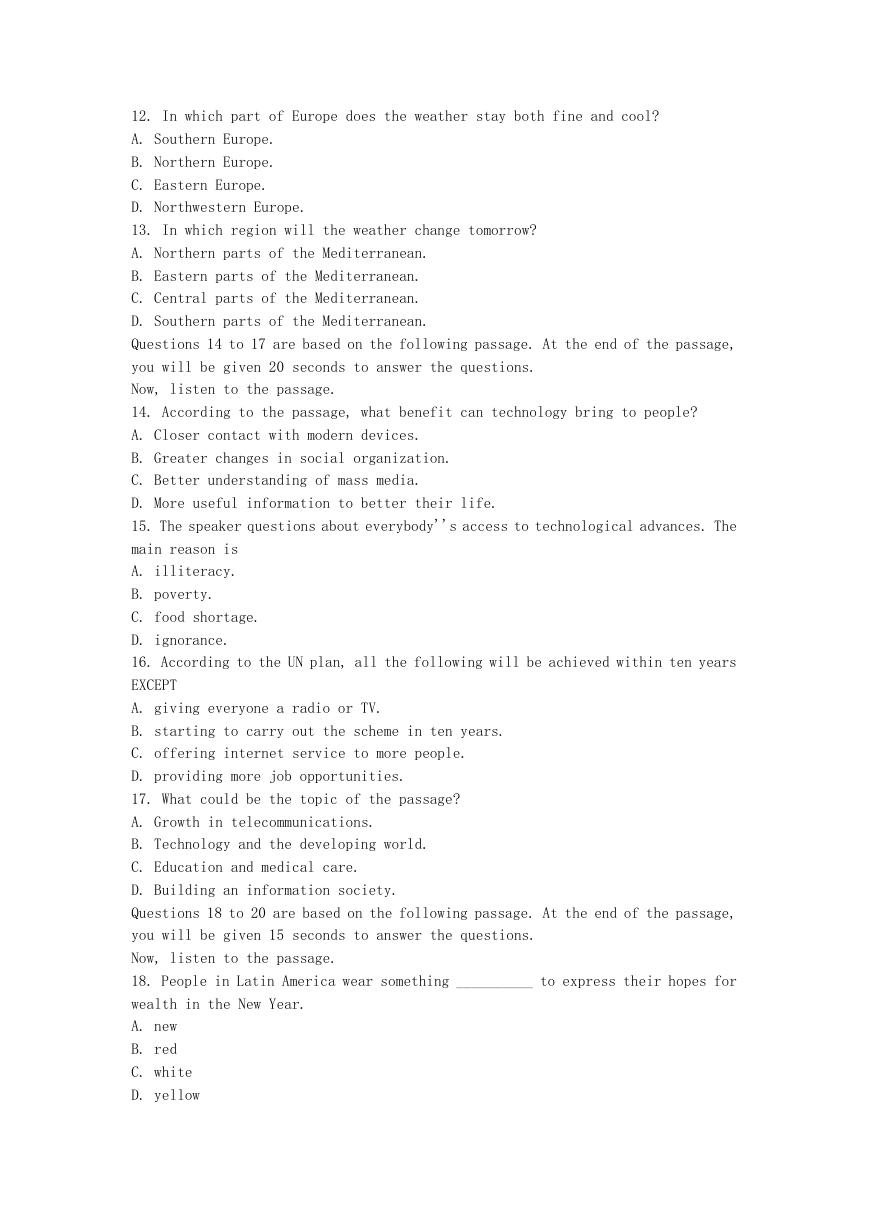
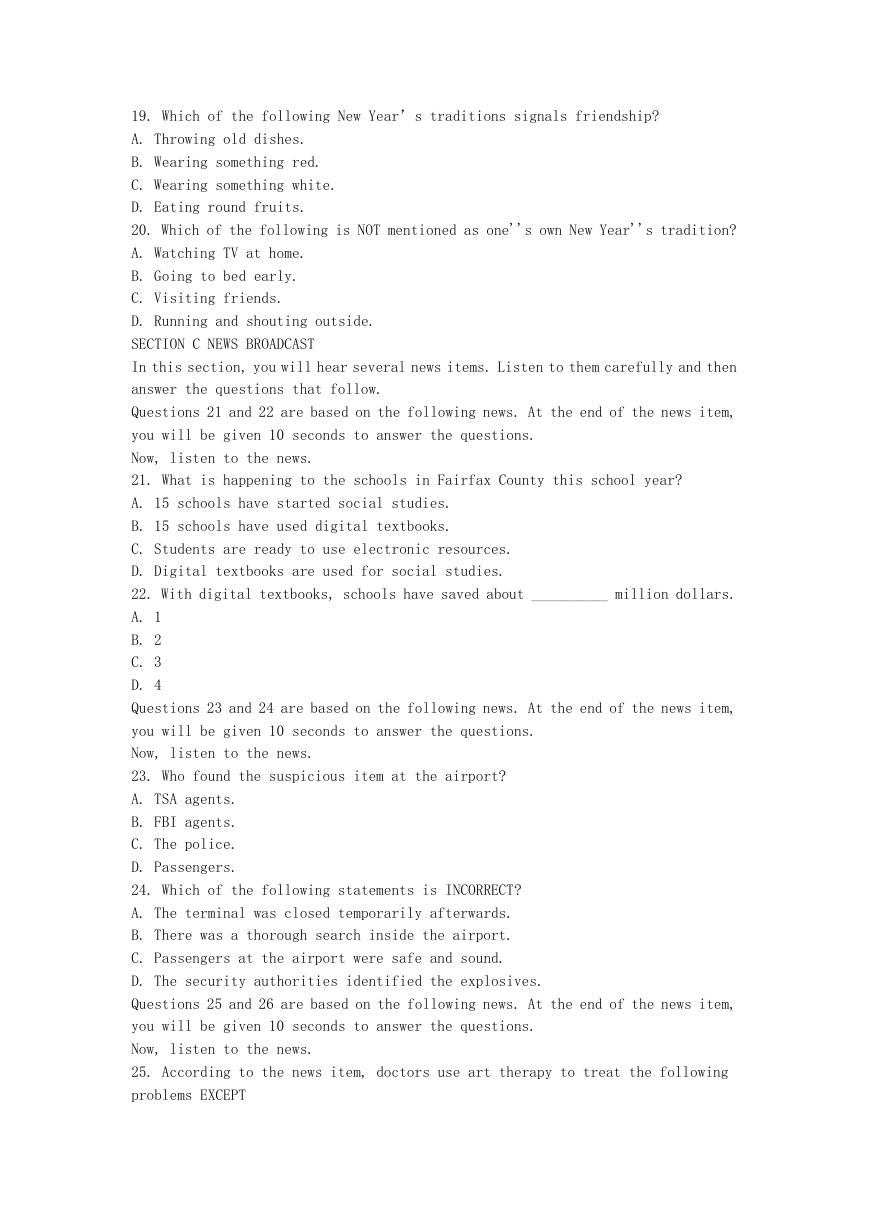
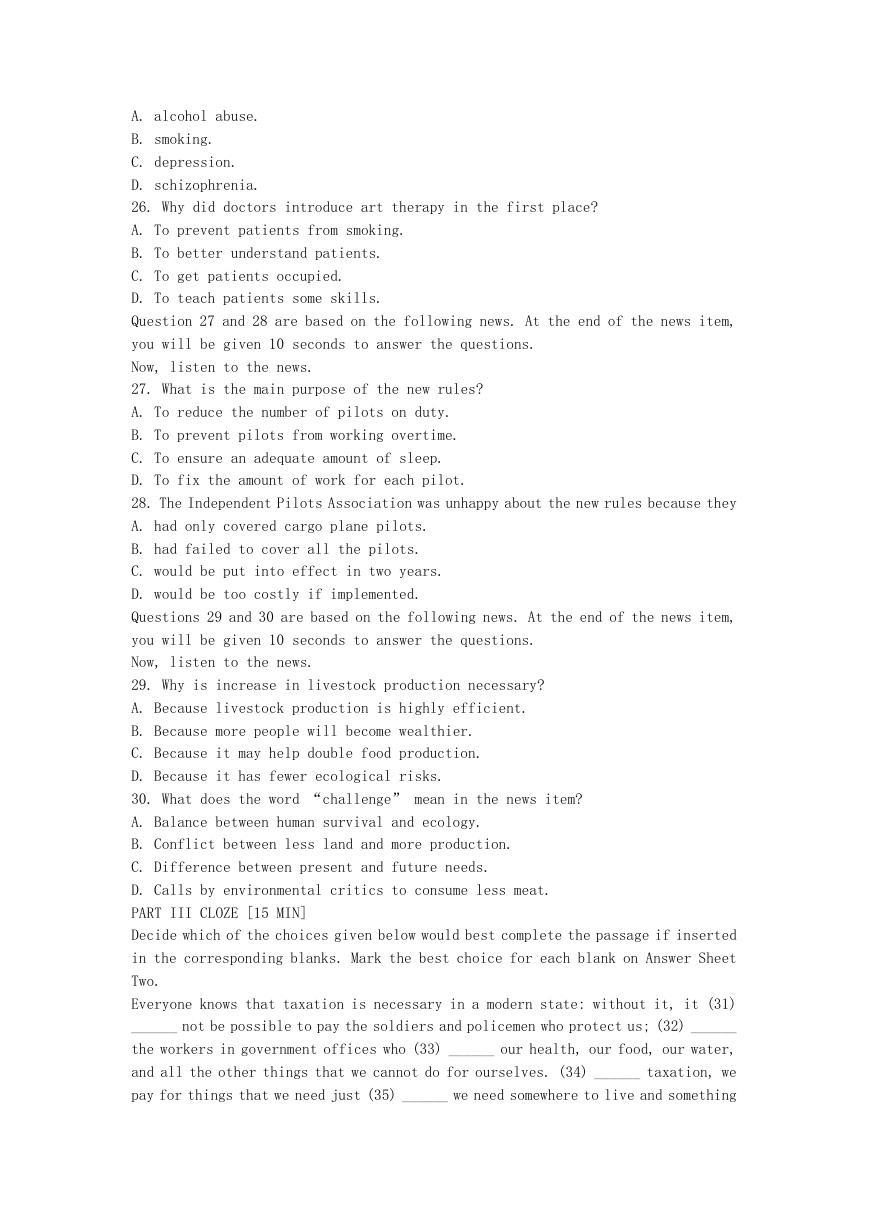
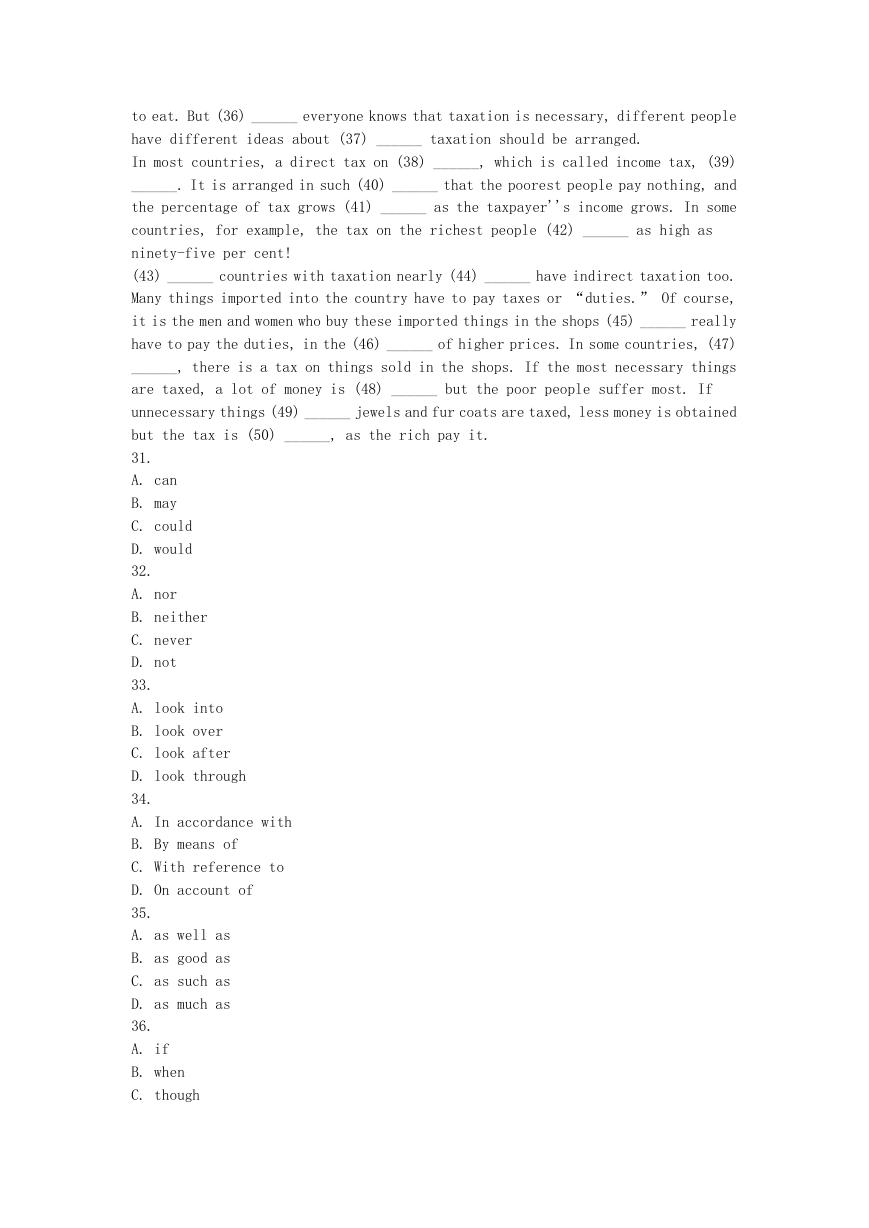
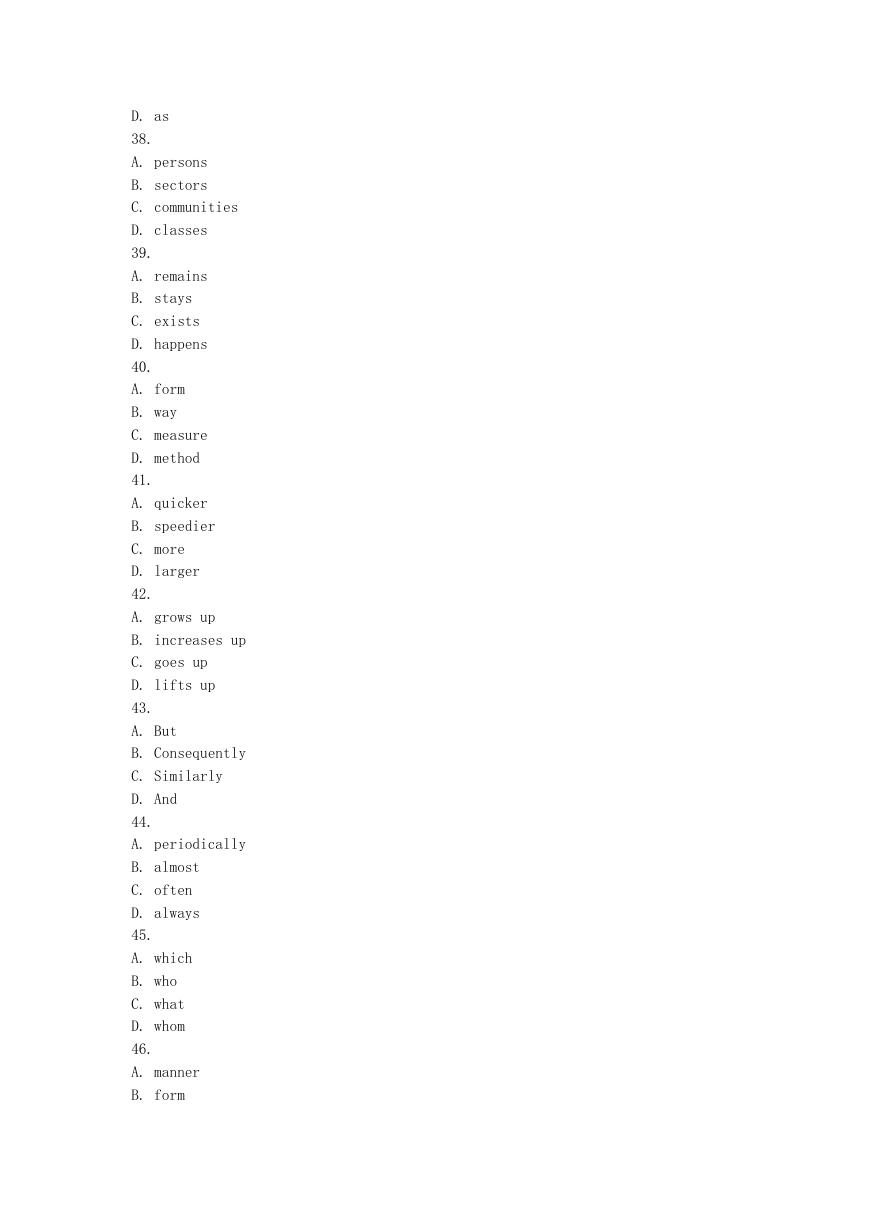
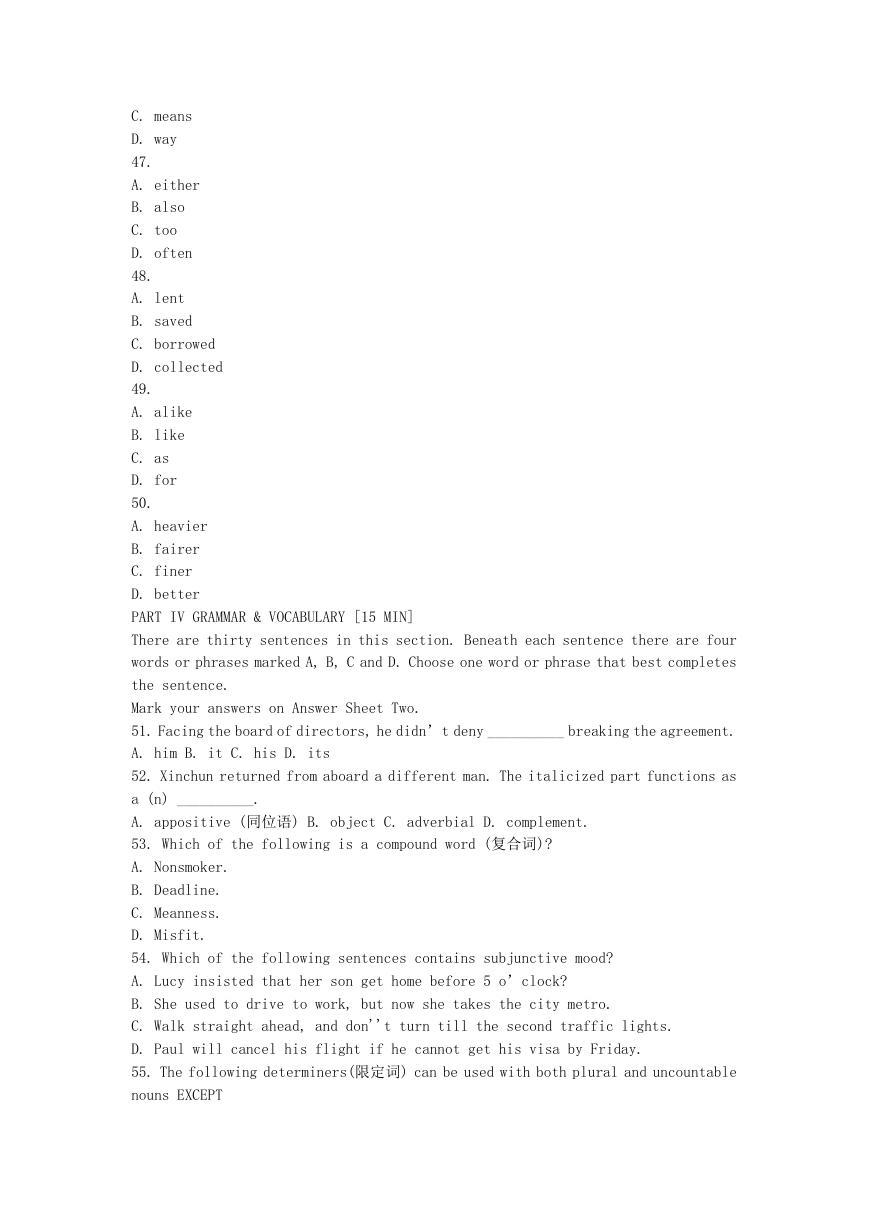








 2023年江西萍乡中考道德与法治真题及答案.doc
2023年江西萍乡中考道德与法治真题及答案.doc 2012年重庆南川中考生物真题及答案.doc
2012年重庆南川中考生物真题及答案.doc 2013年江西师范大学地理学综合及文艺理论基础考研真题.doc
2013年江西师范大学地理学综合及文艺理论基础考研真题.doc 2020年四川甘孜小升初语文真题及答案I卷.doc
2020年四川甘孜小升初语文真题及答案I卷.doc 2020年注册岩土工程师专业基础考试真题及答案.doc
2020年注册岩土工程师专业基础考试真题及答案.doc 2023-2024学年福建省厦门市九年级上学期数学月考试题及答案.doc
2023-2024学年福建省厦门市九年级上学期数学月考试题及答案.doc 2021-2022学年辽宁省沈阳市大东区九年级上学期语文期末试题及答案.doc
2021-2022学年辽宁省沈阳市大东区九年级上学期语文期末试题及答案.doc 2022-2023学年北京东城区初三第一学期物理期末试卷及答案.doc
2022-2023学年北京东城区初三第一学期物理期末试卷及答案.doc 2018上半年江西教师资格初中地理学科知识与教学能力真题及答案.doc
2018上半年江西教师资格初中地理学科知识与教学能力真题及答案.doc 2012年河北国家公务员申论考试真题及答案-省级.doc
2012年河北国家公务员申论考试真题及答案-省级.doc 2020-2021学年江苏省扬州市江都区邵樊片九年级上学期数学第一次质量检测试题及答案.doc
2020-2021学年江苏省扬州市江都区邵樊片九年级上学期数学第一次质量检测试题及答案.doc 2022下半年黑龙江教师资格证中学综合素质真题及答案.doc
2022下半年黑龙江教师资格证中学综合素质真题及答案.doc